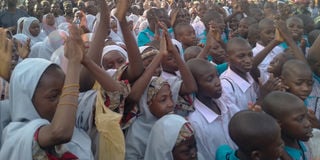Premium
Nigerian village celebrates the return of kidnapped students

Nigerian students and staff who were kidnapped this month arrive after they were freed, in Kaduna, Nigeria March 28, 2024.
What you need to know:
- The kidnappings have become an almost daily occurrence, especially in northern Nigeria, tearing apart families and communities that must pool savings to pay ransoms.
- Neither Nigerian presidency spokesperson Ajuri Ngelale nor Information Minister Mohammed Idris responded to requests for comment on whether a ransom had been paid in this instance.
The whole village of Kuriga ran towards the convoy of buses shouting "Our children are back!" and "Alhamdulillah," meaning "Thank you, God", to welcome home more than 100 students and staff who were abducted this month in Nigeria's northwest.
The army announced on Sunday it had rescued 137 hostages - 76 female and 61 male - in the neighbouring state of Zamfara, days before a deadline to pay a 1 billion naira ($767,000) ransom for their release.
The students described being marched through the forest for more than two weeks in an attempt to hide from authorities, having to sleep under trees, being fed half cooked rice and given only filthy water to drink.
"Even the bandits were hungry," said Amina Alhassan, one of the kidnapped students, talking through the window of a bus as it pulled into Kuriga.
"We used our dirty headscarves as sanitary pads...we were crying and praying every day."
Tanko Musa, one of the freed students, said the kidnappers told them the government had paid the ransom and they could be released as a result.
"We don't know how much was paid, but they said the government has paid them," he said.
Earlier this week, Information Minister Mohammed Idris said no ransom had been paid.
One security source said he saw 14 black bags, which he assumed contained the ransom money, being delivered to an area in Zamfara state where the students were held after their March 7 abduction.
Relieved parents crowded around the buses to catch a glimpse of the children they thought they had lost.
"We had no hope of seeing our children again," said Yunusa Musa, whose two children, Hafsatu, 19, and Zaituna, 16, were among those kidnapped.
Yunusa called on the Nigerian government to deploy soldiers in the town and its surroundings to allow villagers to farm the land they had to abandon because of rampant insecurity.
Abductions at Nigerian schools were first carried out by jihadist group Boko Haram, which seized 276 students from a girls' school in Chibok in northeastern Borno State a decade ago. Some of them never came back.
But since then, criminal gangs without ideological affiliation have adopted the tactic to obtain ransom money.
The kidnappings have become an almost daily occurrence, especially in northern Nigeria, tearing apart families and communities that must pool savings to pay ransoms.
Neither Nigerian presidency spokesperson Ajuri Ngelale nor Information Minister Mohammed Idris responded to requests for comment on whether a ransom had been paid in this instance.





